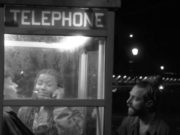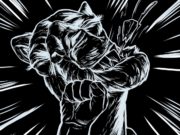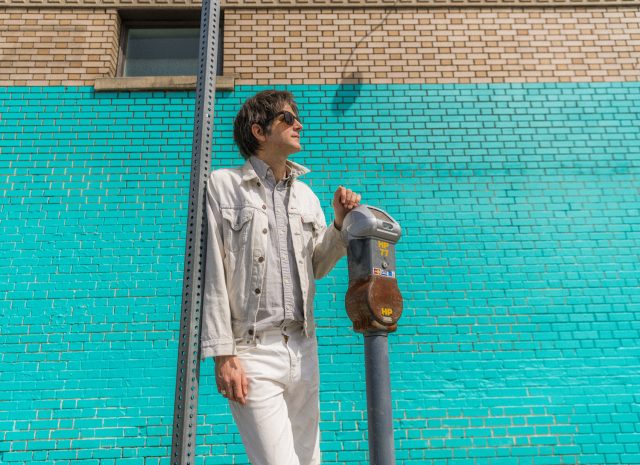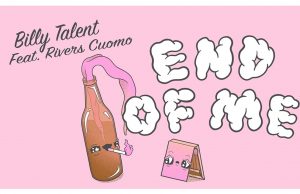Luther Russell has just realized something very cool about his latest album Medium Cool.
“This is fairly strange,” the singer-guitarist, songwriter and producer says from his L.A. home, “but the record is actually sequenced in the order I recorded it. That is really rare. And it just happened to work out that way. We essentially did the first side the first day and the second side the second day. It was basically cut as you hear it — so the experience you’re listening to is really the experience of recording it.”
Taking things as they come is nothing new for Russell. If anything, it’s been the hallmark of his long and winding career path. The grandson of lyricist Bob Russell (He Ain’t Heavy, He’s My Brother) and grandnephew of songwriter Bud Green, he has been making music since childhood. As a teen, he played with Jakob Dylan in The Bootheels. In his 20s he fronted The Freewheelers, who released a pair of major-label albums. Since then he’s released a string of varied solo discs, toured with Robyn Hitchcock, formed the band Those Pretty Wrongs with Big Star drummer Jody Stephens, written songs for Weezer and produced albums for a lengthy roster of artists.
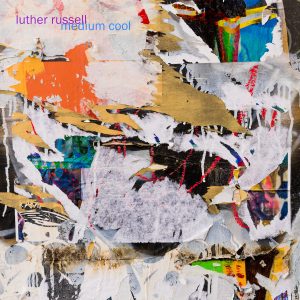 Medium Cool, the prolific artist’s ninth solo release (counting online-only albums and 2018’s Selective Memories anthology of early work), is his most focused, commercial and upbeat work since The Freewheelers, recalling the ’70s pop-rock of Alex Chilton and Big Star with its jangly guitars, loose-limbed beats, soulfully raspy vocals and lyrics that romantically and unabashedly preach the holy trinity of cars, girls and rock ’n’ roll. With the album garnering rave reviews (including mine), the affable Russell got on the blower for a freewheeling chat about being to the side of our times, cracking the code and making a rock ’n’ roll record about rock ’n’ roll. Here are the highlights (along with plenty of links to his music):
Medium Cool, the prolific artist’s ninth solo release (counting online-only albums and 2018’s Selective Memories anthology of early work), is his most focused, commercial and upbeat work since The Freewheelers, recalling the ’70s pop-rock of Alex Chilton and Big Star with its jangly guitars, loose-limbed beats, soulfully raspy vocals and lyrics that romantically and unabashedly preach the holy trinity of cars, girls and rock ’n’ roll. With the album garnering rave reviews (including mine), the affable Russell got on the blower for a freewheeling chat about being to the side of our times, cracking the code and making a rock ’n’ roll record about rock ’n’ roll. Here are the highlights (along with plenty of links to his music):
Congratulations on the new album. Is releasing music still nerve-wracking, or are you old and jaded after all these years?
(Laughs) Oh no, it’s always nerve-wracking and exciting. Because I tend to do records that aren’t like the one before whatsoever. So I’m constantly throwing people off my scent. I mean, I think there’s some kind of through-line — though it’s not for me to say what it is. I don’t really know what it is myself. I can say that this is an album I probably should have made already. But that’s how every album feels after the fact.
Do you go back and listen to the older stuff and reflect on it?
Not really. Occasionally I go back and listen to stuff I’m still fond of and think, ‘What the hell? How did that happen?’
In a good way or a bad way?
Oh, in a good way. I mean, I did an album a while back called Repair with Ethan Johns. And I think that’s a good record. I think it would have probably fared a lot better now. I tend to do records that don’t seem to be exactly in the air at the time. They’re in my air.
So, you’re ahead of our time?
Maybe to the side of our time. To be ahead is to do something particularly futuristic, whatever that is. But anything futuristic becomes the past anyway. So I just try to do stuff that feels right for me. And I don’t particularly try to get out of my comfort zone. I just like a lot of things and I try to do things I think I can do, or that come naturally to me. Like the Invisible Audience record. I guess it’s my last record, technically. But it was a double album and it had so many things going on and I somehow found a cohesion there. But that was definitely a lot of pent-up stuff, so it was a bit all over the map — but in a cool way, I think.
Does your relationship with the older stuff change over time?
That’s interesting. The (Selective Memories) anthology woke me up to the idea that there was any kind of consistency. There’s a few early things from the ’80s on there. But it just so happens that the stuff I thought was the best was the stuff that probably had a relationship to the other things. So you kind of start realizing what you do best. But God, after a certain amount of time it’s so hard to tell. I do think the quality has been good.
Do you think you’re getting better at realizing your own vision — getting it out of your head and onto the tape?
Yeah. I think I’m better equipped to do what I hear in my head. But I’ll often hear things I did in the past — even stuff I did when I was a kid — and go, ‘That wasn’t bad.’ I wish I would have known that I should have stuck with that. It’s like when you first start out singing: You don’t know what your key is, you don’t know what your range is. And when you know what your range is, you tend to be safer.
You’ve said Medium Cool is a rock ’n’ roll album about rock ’n’ roll. I’m not sure if that’s Zen or meta or meta-Zen. How did you end up going down that rabbit hole?
Boy, that is a good question. I don’t mean to be elusive or evasive; I’m still just figuring it out myself. Basically, I heard a sound in my head and as the lyrical content emerged it was looking back at what the sensation and the feeling of rock and roll was and what it means to me. They’re impressions, definitely. It’s impressionistic. It could be how it felt when you first got interested in a scene, like in the song The Sound of Rock And Roll. So it’s conceptual to a degree in that sense. To me it’s about rock and roll. But my interpretation and definition of rock and roll may not match other people’s.
Is your songwriting more inspiration or perspiration?
Definitely inspiration. These days I’m more interested in the gut feeling of it. I’m more interested in the stream of consciousness. But over the years, I think I’ve gathered the tools to make sense of that stream of consciousness.
And to make it come out right the first time?
Yeah. That’s exactly what it’s been about: Trying to make it come out right the first time. That’s totally what this record is about. If I hadn’t nailed it in the first couple of days, I would have had to pivot and think, ‘Maybe I have to plan it differently.’ But it came off pretty well. I got a lot of the tracks. And I just had a feeling it would work out.
Was is all done to analogue tape?
It was. We cut it to an old Ampex eight-track And we mixed it to a 1/4″ Ampex. If you know about the old ’60s gear, punching (in fixes) is a two-step process, so we couldn’t do much of that. It pretty much kept the rethinking out of it.
You’ve written a lot about your love of analogue recording and using old four-track cassette recorders and so on. What is it that attracts you to that technology?
Well, if you can pull off what you’re going for, it has the potential to sound better quicker. Of course, the more ambitious you get, the more difficult it might be to do it that way.
Are you a purist when it comes to using old gear?
I don’t think i’m a purist. I’m no slave to it, that’s for sure. It can come off that way. But it’s just comfortable. It’s just a way I know. I just don’t like staring at screens when I make music. It just doesn’t work for me. I stare enough at screens for other reasons.
What about when you’re producing? Do you still stick to tape?
Not necessarily. I just tend to not be the one staring at the screen. I tend to be the one listening to the music.
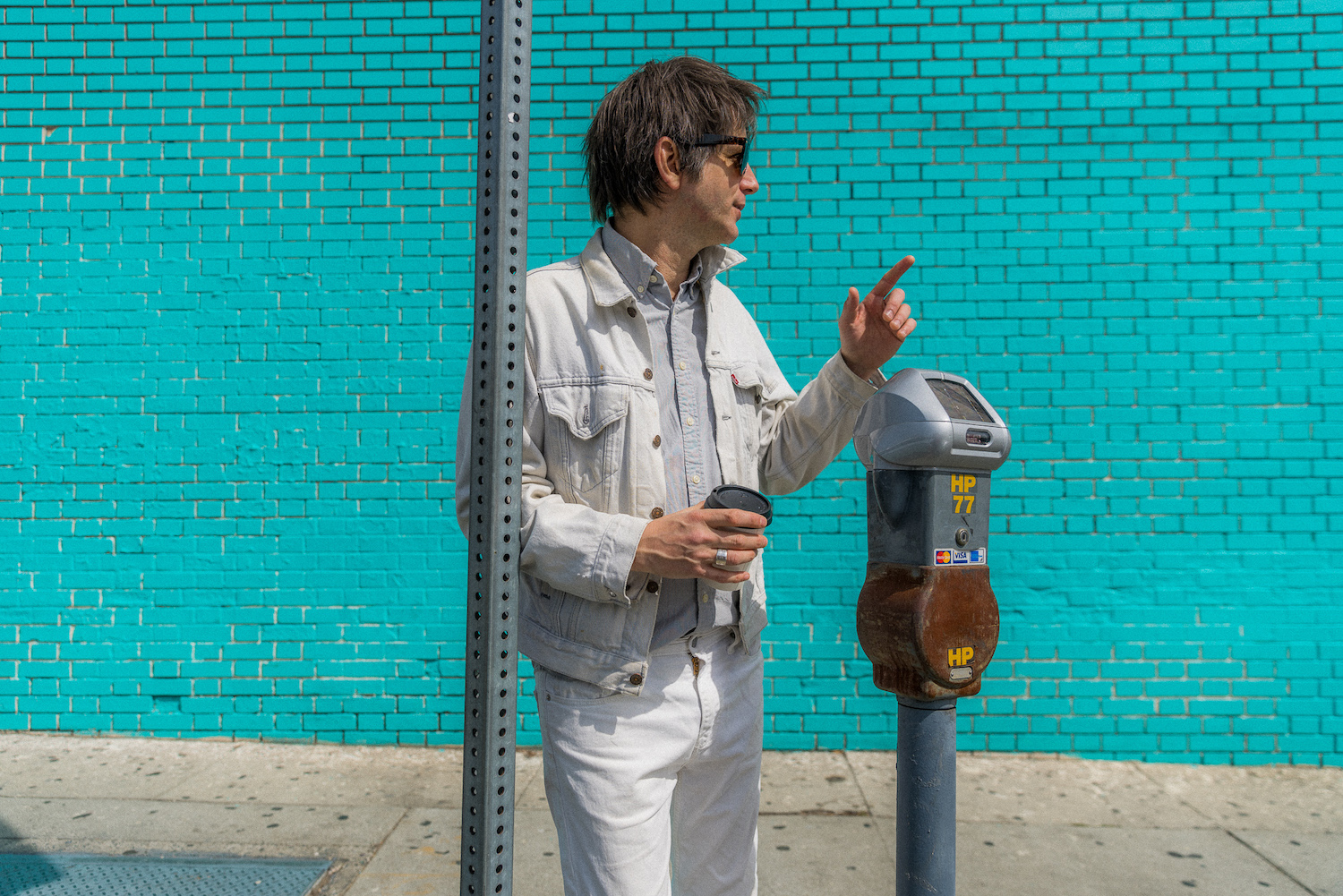
How did you get into producing and what’s your philosophy?
I would say it’s all based on trust. I got into it because people trusted me. And at the end of the day you’re sitting in a room and a bunch of eyes are staring at you. You gotta steer the ship and you gotta push it forward. And you don’t want to let the artist down. You want to help them realize their dreams. I think there’s also a trust because I know a lot. I’ve not just listened to the right music and all that, but I’ve got inside what makes it tick, and how certain things have been achieved. I don’t see a lot of dead ends or walls in the studio. I always think there’s a way out.
If you had to choose between being an artist or a producer, which way would you go?
I think I prefer to be an artist in my own right, though there’s always someone I’d like to work with as a producer. I’m asked from time to time, ‘Who would you like to work with?’, and they always sound like big-headed responses. But the truth is, I’d love to work with Dion or Don Everly or even Dylan. I only say it because it’s something I think I could do. And because I hear something that people aren’t doing with them. It’s not for the squeamish, that’s for sure.
You spend a large part of your time working for other artists as a musician or songwriter. Is that just a financial necessity of the hunter-gatherer lifestyle of a musician?
It surely can be. But it’s also a learning experience. You take someone like Robyn (Hitchcock). When he asked me to play with him I knew I would learn something. He’s a complete genius with his chord changes and with his melodies and with his lyrical angles. There were things he showed me I definitely did not know. And there are life lessons with everybody I work with. There’s always a new situation that keeps me on my toes musically or artistically or even just as a relationship. Even if it’s not completely sympatico, I always learn something. The key is to learn something because it propels you forward.
Congratulations on getting a song on the new Weezer album.
That’s something I never could have predicted. I worked with them a couple of albums ago and those songs turned out really well. They’re another band I really appreciate. They do what they want and do it well, but they’re always pushing. I’ve never experienced a band with a fan base that’s always chasing them, and not the other way around. It’s no accident they are where they are and have lasted as long as they have.
I know your grandfather and granduncle were songwriters. Were your parents also musical?
Yes. Both of my parents dabbled in writing lyrics in the ’70s. They actually each had a song covered by Three Dog Night on their later records. My mom was actually a pretty gifted lyricist. And my dad was a scout for Warner Brothers for a while. He got people signed in the ’70s and he co-wrote with people. He landed between seven and 10 songs on different records by people. So I did see the process firsthand in a way.
I presume they encouraged you to pursue music?
Definitely. I got into music at a really young age. They got me drums when I was four or five. I pounded on those for a few years before I picked up other things. And my mom, from the time I was about seven, was typing out my lyrics. I didn’t think of it as strange at the time. And of course, they had great musical taste. We were a big household for Philly soul. And my dad was friends with the guys in Chicago. Stevie Wonder was a big influence. Randy Newman was big. That was a head start on being a good songwriter.
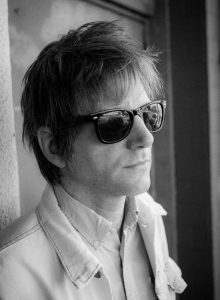
What are you listening to now? Do you keep current or is it still Chicago and Randy Newman?
I do keep current. And I work with people I think are good new artists. As far as my own enjoyment, I’ll put something on the turntable and it’ll just stay there for a few days. Current listening has been Procol Harum’s A Salty Dog. I found that in a record store. It sounds kind of crusty, but I love that record. I listen to Johnny Hartman and John Coltrane. I pulled out all our Brian Eno records recently. So it runs the gamut. I stay really curious for sure. But when it comes down to it, it’s Bob Dylan and The Beatles. It’s not a default setting, it’s just what I really like. And it’s indisputably good. Why can you put on Blonde on Blonde and end up taking life lessons from this kid?
Yeah, he cracked the code. And you’re still trying to crack it yourself.
That’s right! There is a code I think I’m still trying to crack. It’s fun trying to crack it. I don’t want to crack it.
What have you got coming up? I’ve heard there’s another Those Pretty Wrongs album coming, and your web site lists an upcoming solo album titled Rent Money.
Jody and I just finished our second record. We’re still figuring out a home for it, but we’re really happy with it. If anything, it serves to solidify that this is our sound, this really is what we do. And Rent Money is an album I did 10 years ago and forgot about. I can’t remember how it came about, but it’s in the vibe of Dr. John’s Gris-Gris — sort of bluesy voodoo. I remember being weirded out by it at the time. But now it doesn’t sound so weird. And I have a new album I’ve been working on for the past year. It’s different than this one. It’s still a rock n roll record, but it’s on the wavelength of Lloyd Cole and the Commotions or Echo and the Bunnymen or the Paisley Underground stuff. I wasn’t going for a sound; it’s just how these songs are going. It’s based around acquiring a Rickenbacker 12-string.
Do you have a lot of unreleased records floating around?
There are a few. For instance, when I came back to L.A from living in New York, I did an instrumental, really quiet kind of John Fahey-type of record. called How I Won the West. I ended up just putting that up on my Bandcamp page, and a lot of people get that all the time. So there’s been a few records like that.







